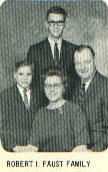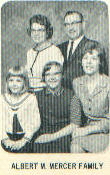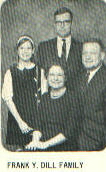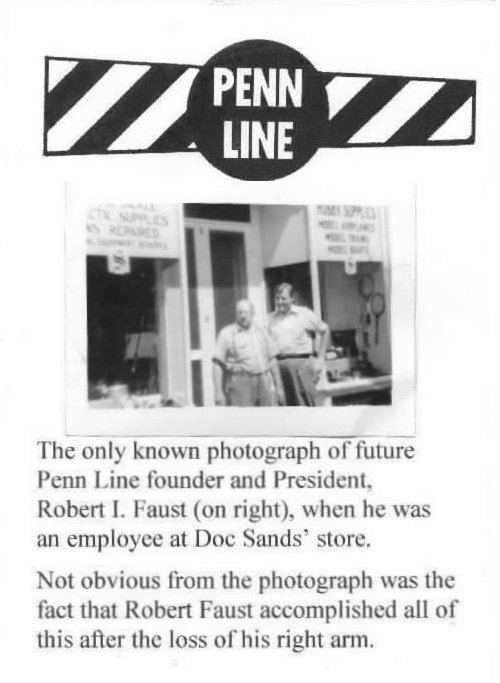A Short History of Penn Line |
By Frank Dill |
The Early Years |
| I am going to give a personal account of Penn Line Manufacturing, a maker of HO scale model trains from 1947 to 1963. The company was in my hometown, Boyertown, Pennsylvania. The company's existence pretty much corresponds to my youth, I was one going on two when the company was started. Penn Line went bankrupt the year I entered college. The three founders were a generation older than I, but I had some acquaintance with each. I knew Penn Line president Robert (Bob) Faust best. He was a close friend of my father's and we spent many summer holidays at his home and traveled to the New Jersey shore together several times. Albert (Abe) Mercer was a frequent customer in my Grandfather's store. I remember him as far and away our best balsa wood customer. Linwood Stauffer was just an occasional customer, his daughter was in my class at Boyertown High School. Boyertown only had a population of about 4000. If you had lived in Boyertown during those years, you probably would have known these men. And I believed that if you had know them, probably you would have liked and respected them as I did. |
 |
 |
 |
|---|
Family photos from St. John's Lutheran Church
Boyertown, Pennsylvania 1966 Photos taken three years after
Penn Line close. All three founders and their families were members of the same church that my family attended. I have included thumbnail size photos from the 1966 church directory. I am sorry that the photos are so small. The photos were taken twenty years after the men began to form Penn Line. The point that I want to make is how young the three were, Faust and Stauffer were 28 when they started making the plans. Also note that they all had children to support during the Penn Line years. Abe and Linwood were married to sisters maiden name Karver. The mothers in the center and right photos are the sisters. The founders of Penn Line are the men in the photos. Linwood Stauffer is the one standing in the center of the third photo. At the time of the photos they were in their 40's and the company had already been closed three years. Coincidentally my Grandfather had a Penn Line association right from its planning stages. His name was Doc Sands. Just by "accident" one of his first employees became a founder and later president of Penn Line. Doc Sands Store and Penn Line trains both began in the small town of Boyertown Pennsylvania. Both began as one room operations about a year apart in time and two blocks in distance. Doc Sands opened his sporting goods and hobby store in the summer of 1946. One of his very first employees was Bob Faust who had just lost his right arm in an industrial accident. No longer able to continue working as a tool and die maker, Bob Faust took a temporary job in Doc Sands Store. The story of the accident deserves telling because I have heard it said many times that were it not for the accident there might never have been a Penn Line. Bob Faust was working as a tool and die maker at one of the town's largest industries the Boyertown Burial Casket Company. Boyertown had about a half dozen factories that provided very steady employment and wages sufficient enough for a skilled worker to afford his own home and live very comfortably working for the same company his whole lifetime. Abe Mercer worked at the Boyertown Auto Body Works another such factory where it was not uncommon for several generations of the same family to find lifelong steady employment. Linwood Stauffer worked at Tung-Sol, still another of Boyertown's large employers. It was not unusual for workers at that time to think they would spend their entire working life at such a factory. The Casket Company operated in a multistoried building that used large freight elevators to move the caskets between floors. One day Bob Faust went between floors on an elevator filled with caskets. His arm was not completely inside the elevator. He lost his right arm which pretty well ended any chances of a career as a tool and die maker. |
| One of the reasons that I have so much respect for Bob Faust is because of what happened next. You all know what most people would do today after such an accident. The would sue the company for all it is worth and sit back and do nothing for the rest of their lives. Not Bob Faust. While he was recovering he took a low paying job and immediately starting planning what to do the rest of his life. You will notice from the pictures above and below that Bob always posed so that know one would know of his handicap. |
 |
Bob Faust's loss of his right arm ended any chance of continuing his career as a tool and die maker. It also explains his signature on letters as president of Penn Line. The simple signature made all the customer's feel like they knew him personally. |
|---|
 |
At Doc Sands Store Bob had access to wholesale model train catalogs
and the opportunity to meet some of the salesmen who called on the
store. About this same time two brothers -in -law from Boyertown were
thinking about going into business together. At first Albert M. (Abe)
Mercer and Linwood K. Stauffer were not completely sure what business
this would be. Abe dropped into the store often to chat with Bob and
look over the wholesale model train catalogs. Bob had frequent chances
to talk with the model salesmen. And all three men talked together
after hours. Abe and Linwood attended a model train convention and
noted that there were not many models available of the locomotives
of the Pennsylvania Railroad. Their plan was to produce models of
these locomotives, hence the name Penn Line. They got together
an example of their work.
One day Abe and Bob waited in Doc Sands Store for the weekly visit of a model distributor from Philadelphia. They convinced him to distribute their work if they went into production. Abe would later recall this moment as the official start of the Penn Line Manufacturing Co. Now back to the statement that without the accident there might never have been a Penn Line. Mercer and Stauffer were thinking about going into business. I stress the word "thinking." They had decided that the business would be model trains even before Bob Faust entered the picture. The reality is that Mercer and Stauffer both had secure jobs and young families to support. Bob had the necessity to find a career. Which is why he pushed so hard to gather the information and help from the model distributors who called at the store. |